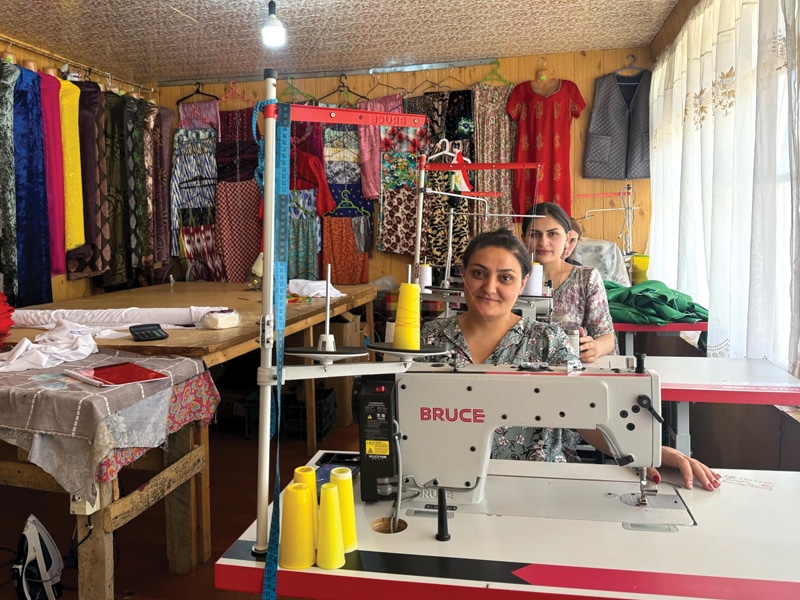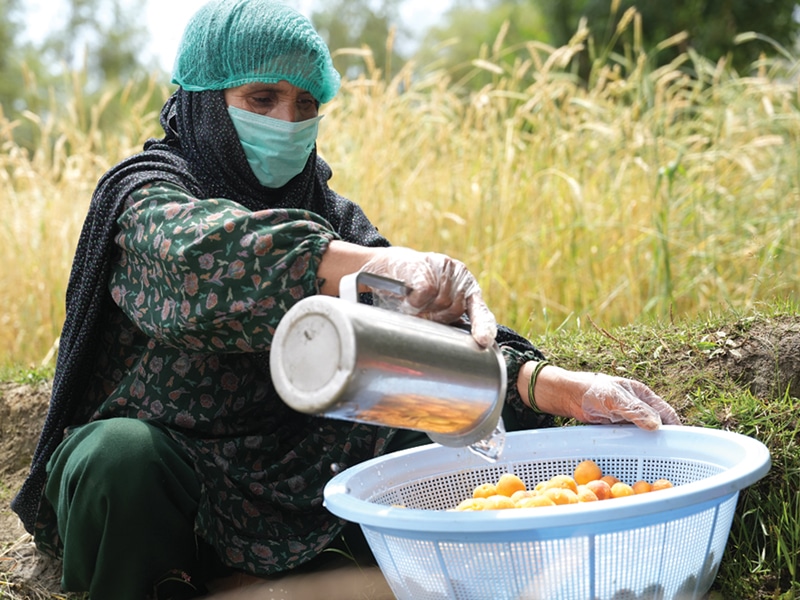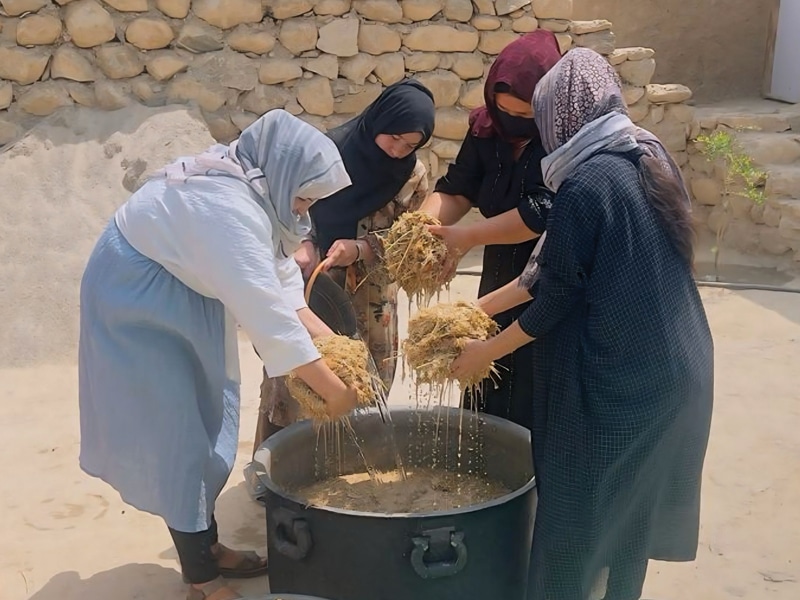By Bella Pich and Tonya Andrews
At CAI, we believe empowering women is the most effective way to reduce poverty, strengthen families, and foster lasting community resilience. That’s why donor support fuels our Women’s Economic Empowerment Programs—initiatives that equip women with the skills, tools, and confidence to participate in local economies and transform their lives.
The programs were first started in Tajikistan, where CAI laid the foundation for women to create their own paths to financial freedom by offering them practical business training and entrepreneurial support. Building on this success, the model expanded to Pakistan and now CAI is launching a pilot Women’s Economic Empowerment Program in Afghanistan, tailored to address unique local challenges and help women there begin to reclaim their financial independence. In the stories ahead, you’ll learn how these programs are helping women reshape their beliefs about what’s possible for themselves, their families, and future generations.
TAJIKISTAN
In Kalai Khumb along the Pyandzh River in Tajikistan, 46-year-old Maisara spent most of her days raising children and managing household chores. She enjoyed her role as a mother and caretaker and rarely thought about life beyond her home. In her spare time, she practiced traditional Tajik embroidery and sewing, never imagining her hobby could become a source of income.
That changed when she joined Central Asia Institute Tajikistan’s (CAIT) Women’s Economic Empowerment Program, which offers practical training in financial literacy, business planning, and entrepreneurship. “The most important thing for me was learning how to manage money and plan properly,” Maisara recalls. “Before, I never thought seriously about business, but the training gave me the confidence to try.”

With 1,500 Tajikistani somoni (about $157 USD) from her family’s savings, Maisara bought fabric and supplies and began producing handmade goods. Though balancing work and home life was difficult at first, her business steadily grew. “Before, my husband and son had to cover everything. Now, I can contribute. They respect me more.”
Maisara’s transformation reflects the broader impact of CAI’s Women’s Economic Empowerment Programs. In a recent evaluation, 91% of participants reported increased self-confidence, and 97% saw growth in their household income after completing the training.
Today, Maisara mentors over 60 girls, teaches at the district employment center, and leads the local women’s council, showing that the domino effect of empowerment can extend far beyond one home. “The training changed my way of thinking,” she says with a smile. “I believe that if women have the right support, we can all succeed.”
Since 2019, CAI’s economic empowerment programs in Tajikistan have reached more than 360 women—including 150 new participants this year alone. With an average training and start-up cost of just $367 per beneficiary, the results are powerful and manifold: 71% of participants now report better access to healthcare, and 73% have improved access to education, both due to an increase in household income.
Stories like Maisara’s are a testament to what’s possible when women are given tools, training, and trust. With the right support, they’re not just building businesses; they’re building stronger families, communities, and futures.
PAKISTAN
Across the lush valleys of northern Pakistan, women have long cared for their family’s fruit and nut trees. Often, these trees produce greater yield than the family can consume—leaving the excess to waste. Though selling the surplus could generate income, many women lack the training and resources to make this happen.
This challenge is part of a larger issue across Pakistan and much of South and Central Asia, where women face economic insecurity, limited access to formal employment, and systemic barriers to independence. Without proper employment training or support, breaking the cycle of poverty remains difficult.

To address these challenges, Central Asia Institute has partnered with Moawin Foundation to help women build sustainable livelihoods. One successful initiative is the CAI-sponsored Fruit and Nut Dehydration Centers in Gilgit-Baltistan.
Six centers now train women, and sometimes their families, to process, dehydrate, and package fruit and nuts for sale in local markets. Most women already have these trees on their land, so the program builds on what they already grow. Each participant receives hands-on instruction and starting supplies.
In the last year alone, nearly 100 women, averaging 47 years in age, saw their income double or triple to 40,000–100,000 Pakistani Rupees (roughly $140–$351 USD). “The trainer showed us how to make Turkish-style apricots and jams. It was like unlocking a treasure chest of knowledge,” said one participant. “Last year my income was 22,000 PKR [about $78]—after the training, it increased to 48,000 PKR [about $170].”
But the impact doesn’t end there. These women now have the skills and confidence to pass on what they’ve learned, empowering other women and girls in their villages. And with a modest investment of just $285 per beneficiary, this program is not only changing individual lives but also paving the way to uplift families and strengthen entire communities.
AFGHANISTAN
In Afghanistan, where the Taliban’s restrictive bans severely limit women’s ability to work and move freely outside the home, economic opportunities have been more difficult to generate. In response, CAI and our two Afghan partner organizations have launched three different Women’s Economic Empowerment Programs to help women generate income for themselves and their families.
Over the last year, Shining Star Educational Organization of Afghanistan (Shining Star) and The Welfare Association for the Development of Afghanistan (WADAN) conducted market surveys to determine potential livelihood options and market gaps. These assessments were essential for understanding how local economies function, evaluating the needs of target populations, and designing effective, community-informed project strategies. Just as importantly, the surveys also offered insight into the social and cultural dynamics at play, particularly the constraints and opportunities shaped by gender roles, traditions, and other societal norms.

Shining Star is currently leading dairy production and processing initiatives, as well as a home-based mushroom cultivation program. WADAN is focusing primarily on dairy production and processing. Through these efforts, 55 women have received cows and milking supplies to produce and sell milk, while 20 women completed dairy processing training focused on making yogurt, cheese, and Quroot—a traditional Afghan dried dairy product. Participants also received starting supplies and entrepreneurship training to launch small-scale businesses.
Twenty women took part in a three-day mushroom cultivation training, giving them the tools to grow and sell mushrooms from home—an especially critical solution as many are unable to leave their houses without a male guardian. The women are currently in the process of growing and harvesting their mushrooms, to sell them fresh at local markets in their village.
While these programs are still in their early phases, it was shown in a recent case study that targeted vocational training programs allow women-led enterprises to thrive in culturally sensitive and community-supported ways. They serve as promising examples for replication in other provinces aiming to empower women through economic inclusion and skill development.
To date, nearly 400 women have participated in CAI-supported Women’s Economic Empowerment Programs across the three countries we serve—each moving one step closer to building a better future. Many have gone on to launch successful small businesses, thanks to the provision of equipment, market connections, and continued coaching. The ripple effects are clearly seen: higher household incomes, improved access to health care and education, and growing leadership roles for women within their communities.
As Rajabsulton, a recent program graduate, shared: “I am so grateful to CAI for the support they gave me during such a difficult period of my life. I had nothing but a dream and a desire to succeed. They gave me the equipment, the training, and the confidence to build my future. Now I know that nothing is impossible if you work hard and look for opportunities.”
Support from donors like you isn’t just funding training—it’s fueling transformation. With modest investments—often less than $600 per participant—Women’s Economic Empowerment Programs deliver lasting, measurable impacts. Women are creating businesses, mentoring others, and breaking the cycle of generational and gender-based poverty. When women rise, entire communities thrive.

